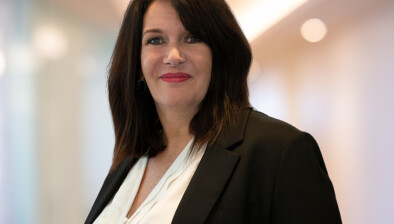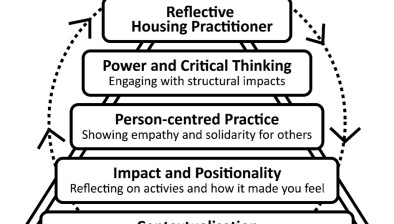Interview with a Streetyouth practitioner
Today’s bumper edition of Homeless Spotlight sees Streetwork highlight its women’s project alongside a blog from its CEO Kenny Forsyth and an interview with a Streetyouth practitioner.
 Streetyouth works with young people up to their 26th birthday who are at risk of, or experiencing, homelessness. The service aims to mitigate against the risk that young people may be affected by multiple exclusion homelessness in the future.
Streetyouth works with young people up to their 26th birthday who are at risk of, or experiencing, homelessness. The service aims to mitigate against the risk that young people may be affected by multiple exclusion homelessness in the future.
The goal is to identify and help young people move into adulthood positively ensuring they are able to maintain secure and stable accommodation. We do this by engaging and working with young people at their own pace, promoting positive relationships and transitions, and forming strong partnerships with relevant agencies.
Streetyouth provides a person centred, strengths based approach when working with young people. We work with young people on their terms and at their pace. We go where they are: on the streets, within youth friendly spaces, educational environments, in their homes or any environment that they feel safe and comfortable.
Streetyouth understands that each young person that we work with is an individual with their own unique skills, strengths and experiences. We tailor our support for each individual. We build safe and supportive relationships with young people to be able to work with them in identifying needs and issues, developing plans and supporting them to achieve these.
Streetyouth has the experience, the understanding and the tools to respond to each service users’ care and support needs. We bring energy and enthusiasm with a strong ethical practice. We value equality, independence, choice and control and provide dignity and respect to all our contacts with young people.
Our experience of street based youth work informs us that street reach is the most effective way of engaging those normally considered hardest to reach, excluded and vulnerable. The primary reason for this is that we go to where young people are and do not wait for them to come seeking support. This approach allows for educational and harm minimisation information, signposting and preventative work as well as for intensive one-to one case management support.
The team delivers street based outreach to find young people on the streets and help to facilitate their access to services, with a focus on Leith and the City Centre. Part of street based outreach includes targeted support. All target outreach clients are case managed and allocated a key worker. We will specifically go out and look for particular young people that may be vulnerable to be able to engage with them and provide appropriate support.
One to one case management support is also provided. This support is offered across the City of Edinburgh. Support focus areas will include: housing, alcohol and other drugs use, physical health, mental health, sexual health, family and social networks, employability, legal and financial issues. Our one to one support addresses the barriers or risks to stable accommodation.
 Streetyouth has a team of experienced Youth Workers that provide support to young people wherever they feel most comfortable. This might be on the street, in other youth services, in their homes, or other community spaces.
Streetyouth has a team of experienced Youth Workers that provide support to young people wherever they feel most comfortable. This might be on the street, in other youth services, in their homes, or other community spaces.
Beth, one of the Streetyouth Practitioners, speaks with the Streetyouth Service Manager about her experiences in engaging with young people.
“I love the variety that this job brings. From walking the streets to picking up donations, learning about new psychoactive drugs that become available, welfare reforms, this job is really what you make of it. It is great to see young people achieve their goals and making the life that they want to live.
“On a street based outreach shift one night we met a 22 year old who was sleeping rough as he had fallen out with his partner. I remember that he was happy that someone had stopped to speak with him. He had been sat in that same doorway for 24 hours and nobody had stopped to help. My colleague and I sat with him for over half an hour signposting services and support like the Streetwork Crisis Centre, housing options team, free food places, and generally finding out about his life.
“After chatting to him for a short time he told us he uses music to vent his frustrations and he performed one of his songs for us. We were so impressed. So much creativity. He was sharing his feelings and story with us, it was a privilege!
“The young man said he might come to see us at the office the next day, we took his phone number to check in with him in case he didn’t. The next day he dropped in and we were able to support him to contact his bank and look into accommodation options. The young man is now in his own tenancy and it makes me feel good. Fulfilled. Seeing people realise their potential. Like we actually do make a difference. Sometimes it makes you emotional. He was very thankful for our support.
“All the young people we meet on street based outreach have different needs from needing a shower, finding cheap or free food, getting help with accommodation, finding help to sort out problems with benefits to getting identification, or just asking questions about sex, relationships, safety, drugs or other topics. A lot of our work involves building relationships with young people so they feel comfortable coming to us in the future. We have the ability to reach young people that have not gone into a service to seek support, but once we start chatting it makes it easier for them to approach us when they need help.
“The difficulties that we sometimes face are that it is not always easy to get the help a young person needs immediately, lots of services and supports have waiting lists, this can be hard as young people want and need support straight away. This is made harder as young people from 16 have to often use adult services that are not really set up for a teenager or young person to access. The hardest is when there is no suitable accommodation for a young person, its hard for them to go into adult environments like bed and breakfasts. Often the problem is that there is not enough long term options for young people to move into, affordable accommodation is really hard to find.
“The starting point with all our support is establishing a good relationship. We then seek to establish what young people are good at and use this to make achievable goals to get them to where they want to be. We work to build confidence and resilience so that by the time we begin to close their case, the young people has the skills to go forward. We make sure that young people know that we are always available in the future if they need support, after all everyone needs help now and again. We’re all human!”
Also from Streetwork…
Blog: Understanding and a compassionate approach to addressing multiple and complex needs







